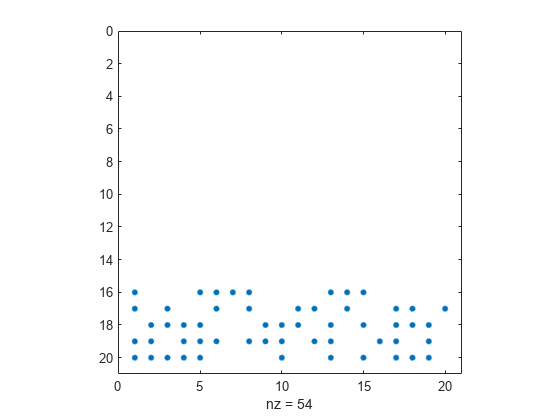spalloc - Allocate space for sparse matrix - MATLAB (original) (raw)
Allocate space for sparse matrix
Syntax
Description
`S` = spalloc([m](#mw%5F7d46c77a-953c-4565-8c3d-c16b71e936da),[n](#mw%5Fa66f1fe6-4939-4a29-a4f1-3c8636ce2a42),[nz](#mw%5F7fff94d1-afe2-4ffd-a8a1-041f77b19036)) creates an all-zero sparse matrix S of sizem-by-n with room to hold nz nonzero elements, where nz >= 1.
Examples
Create Sparse Matrix with Specified Size and Preallocation
Use spalloc to initialize a 10-by-10 all-zero sparse matrix with room for up to 20 nonzero elements.
Define several elements in the matrix.
S = 10x10 sparse double matrix (9 nonzeros) (1,1) 8 (2,1) 3 (3,1) 4 (1,2) 1 (2,2) 5 (3,2) 9 (1,3) 6 (2,3) 7 (3,3) 2
Show the number of nonzero elements in the matrix.
Show the amount of storage allocated for nonzero matrix elements.
Create Sparse Matrix with Nonzero Columns
Use spalloc to initialize a 20-by-20 all-zero sparse matrix with space for 100 nonzero elements.
n = 20; S = spalloc(n,n,5*n);
Then use a for loop to fill in the columns of S one at a time with an average of at most five nonzero elements per column.
for j = 1:n S(:,j) = [zeros(n-5,1); round(rand(5,1))]; end
Plot the sparsity pattern of matrix S. The dots represent the nonzero elements.

Show the number of nonzero elements in the matrix.
Show the amount of storage allocated for nonzero matrix elements.
Input Arguments
m — Number of matrix rows
nonnegative integer
Number of matrix rows, specified as a nonnegative integer.
Data Types: single | double | int8 | int16 | int32 | int64 | uint8 | uint16 | uint32 | uint64 | logical
n — Number of matrix columns
nonnegative integer
Number of matrix columns, specified as a nonnegative integer.
Data Types: single | double | int8 | int16 | int32 | int64 | uint8 | uint16 | uint32 | uint64 | logical
nz — Storage allocation for nonzero elements
nonnegative integer
Storage allocation for nonzero elements, specified as a nonnegative integer. If you specify a value of 0 for nz, then spalloc instead sets the value of nz to 1.
Data Types: single | double | int8 | int16 | int32 | int64 | uint8 | uint16 | uint32 | uint64 | logical
Limitations
- Both matrix dimensions,
mandn, must be smaller than2^31-1on 32-bit platforms, or2^48-1on 64-bit platforms.
Tips
- When you assign several times into a matrix you created with
spalloc, the preallocated memory can prevent repeated reallocations. However, assigning into a sparse matrix is still a relatively expensive operation, which should usually be avoided if it can easily be replaced by one of the following:
Extended Capabilities
C/C++ Code Generation
Generate C and C++ code using MATLAB® Coder™.
Thread-Based Environment
Run code in the background using MATLAB® backgroundPool or accelerate code with Parallel Computing Toolbox™ ThreadPool.
This function fully supports thread-based environments. For more information, see Run MATLAB Functions in Thread-Based Environment.
Distributed Arrays
Partition large arrays across the combined memory of your cluster using Parallel Computing Toolbox™.
Usage notes and limitations:
- See distributed.spalloc (Parallel Computing Toolbox).
For more information, see Run MATLAB Functions with Distributed Arrays (Parallel Computing Toolbox).
Version History
Introduced before R2006a